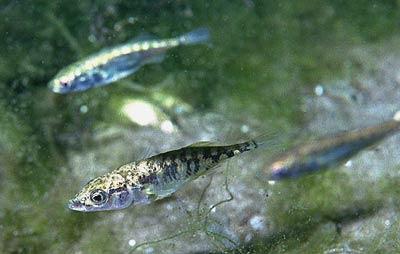Scientists have concluded that different environments have an impact on the evolution of new species. Experiments conducted at the University of British Columbia for the first time show that the reverse is also true.
Scientists from the UBC Center for Biodiversity Research have created a mini ecosystem in a large water tank using different three-spine stickleback types and observing differences in This ecosystem model after at least 11 weeks.
Their findings are published in the April 1 issue of Nature.
Sticklebacks originated from the sea but began to appear in freshwater lakes and streams after the last ice age. For more than 10,000 years - quite short periods of evolution - different species with distinct physical characteristics have formed in some freshwater lakes.
UBC research includes species found in lakes in British Columbia that evolved distinct physical characteristics: limnetic stickleback (smaller freshwater fish with narrower mouths), benthic stickleback (freshwater fish larger with larger mouths) and another may be the ancestor of the two species.
 Three-spined stickleback (scientific name for spiny fish) (scientific name Gasterosteus aculeatus). (Photo: Ron Offermans / Wikimedia Commons)
Three-spined stickleback (scientific name for spiny fish) (scientific name Gasterosteus aculeatus). (Photo: Ron Offermans / Wikimedia Commons)
The study's lead author Luke Harmon, now a professor at the University of Idaho, said: 'Simply what they eat, how to live, even the' recently 'diversified young species also works. big action to the food network. This study is one of the proofs that species diversity plays a very important role. '
Further analysis shows that the tank with the two latest fish species has a larger amount of organic carbon molecules. They block sunlight from entering the water and limit plant growth. Co-author Blake Mathhews, a researcher at Eawag, the Swiss Institute of Science and Technology, said: 'Our research shows that through evolution, stickleback can regulate the environment. bright in the ecosystem they live in. It also proves that predatory species formation may alter the evolutionary cycle of other organisms in the food web. '
The co-author, Professor Dolph Schluter, concluded: 'A new species emerges from an ancestral species and evolves in ways that utilize the environment, thus changing the ecosystem around it. We have only initial understanding of this process. '
Refer
Luke J. Harmon, Blake Matthews, Simone Des Roches, Jonathan M. Chase, Jonathan B. Shurin, Dolph Schluter.Evolutionary diversification in stickleback affected ecosystem functioning.Nature, 2009;DOI: 10.1038 / nature07974
 'Fine laughs' - Scary and painful torture in ancient times
'Fine laughs' - Scary and painful torture in ancient times The sequence of numbers 142857 of the Egyptian pyramids is known as the strangest number in the world - Why?
The sequence of numbers 142857 of the Egyptian pyramids is known as the strangest number in the world - Why? History of the iron
History of the iron What is alum?
What is alum?